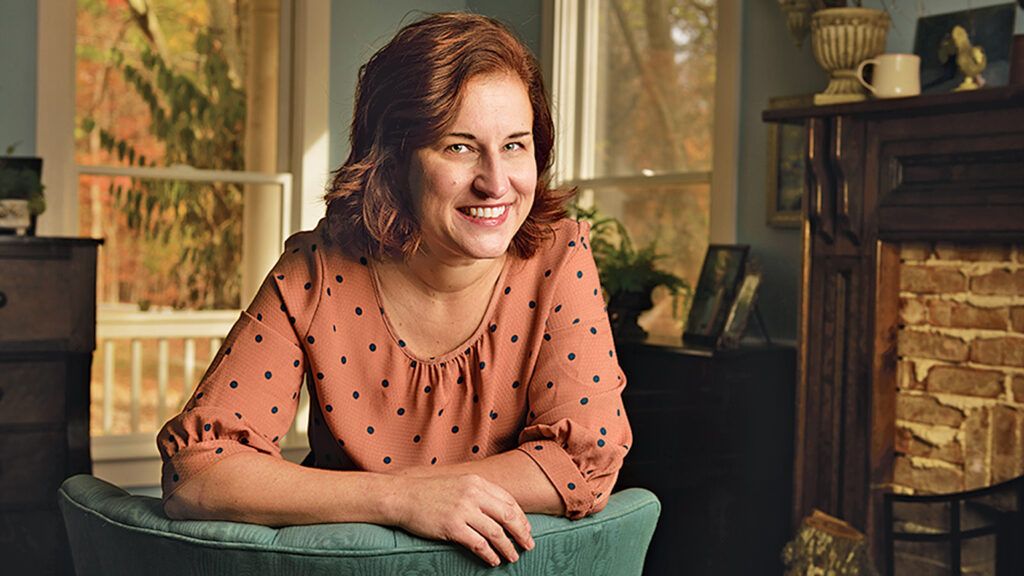Dolphins. that’s how I got into trouble. It was the week before Lent. My husband, three teenage daughters and I were eating dinner at the kitchen table when I brought it up. Something I’d seen on Facebook that afternoon. An acquaintance from church had a penchant for posting overly inspirational quotes accompanied by photos of rainbows, sunsets, ice cream cone-shaped clouds, you name it.
“Now she’s moved on to dolphins,” I told my family. “I wonder if killer whales are next.”
I dropped the word cheesy. Everyone laughed. Everyone, that is, except my 17-year-old daughter, Maggie. She just stared at her plate and moved her peas from one side to the other.
After dinner, I went upstairs to check on her. Maggie was sitting on her bed, earbuds in. I tried to get her to open up about what was bothering her. But she gave me the teenage cold shoulder. I thought I was going to get frostbite.
“I don’t want to talk,” Maggie finally said, pulling out her earbuds. “You’ll just say I’m being cheesy.”
“What?” I said. I was sarcastic, sure, but I’d never call my kids cheesy!
“You’re snarky, Mom. You make fun of everything,” Maggie said. “And FYI, I like those dolphin photos!”
Dolphins? This was about dolphins? Seriously?
All night I tossed and turned, thinking about what Maggie had said. Was she right? Was I too snarky? I wasn’t a mean person. But around people I was comfortable with, I did tend to poke fun at things. It’s just how I’d been raised.
In my family growing up, humor was everything. When I was little, my dad and brother would spend the entire dinner hour outdoing each other’s jokes. I had to keep up if I wanted to be included. And I was the kind of person who noticed everything.
That’s one reason I studied journalism in college. I met Luke there, a nice southern gentleman from Georgia. We fell in love, got married and moved to a little white farmhouse outside of Atlanta. I came from Connecticut, and the South gave me culture shock. Everyone was so polite. Meanwhile, I was like a bull in a china shop.
Even so, I made a good group of friends—I was “the funny one” of the bunch. Whenever we got together for lunch, I couldn’t help but give a running commentary on everything from the design of the menu to the waiter’s serving style. My humor was what made me, well, me, wasn’t it?
The day after my conversation with Maggie, I called my friend Cristell and told her about it.
“Is that true?” I asked. “Am I too snarky?”
Cristell hesitated. “Well, I remember how you used to say everyone is doing the best they can with what they have.
“I must’ve been over-caffeinated that day,” I shot back. Hmm. Maybe I had been a little softer back in the day. My forties had turned me sarcastic. What could I do about it at this point, though? It’s not like there was a 12-step program for smart alecks.
Ah, but there was Lent! Usually I gave up chocolate or shoe shopping. This year, I decided I’d give up the snark. I’d abstain from wisecracks and sarcasm for 40 days. And I’d give up Facebook too—one more dolphin photo and I wouldn’t make it past the first hour of Lent snark-free.
READ MORE: What to Give Up for Lent: 15 Meaningful Suggestions
I wasn’t sure if the planet would continue to spin minus my running commentary, but I was interested to find out. Most of all, I wanted to know if I could change, if I could be the kind of person my daughter could trust not to make fun of her.
Day one went off without a hitch. I had many a snarky thought, but none were actually verbalized. The next day, though, temptation stared me right in the face when I met with my book club. We got together once a month for a nice sit-down lunch. I was on my best behavior.
Things were running smoothly until someone brought up a trigger topic—a book whose popularity I could never fathom. I squirmed in my chair like an antsy kid.
“What’s going on, Laura?” someone finally said. “You’re awfully…quiet.”
“I gave up snark for Lent,” I said. “I’m biting my tongue, which is just about bleeding right now.”
They erupted into laughter. “Good luck with that!” they said. All through lunch I just sat there trying to think of something cheesy to say. I felt like Tigger when he lost his bounce. Lord, I prayed on the drive home, help me find a way to stifle the snark but still be me!
Two weeks into Lent, things were no better. I kept noticing things I badly wanted to comment on, even at church. There was the woman filing her long nails during the service. The guy who’d punctuate the pastor’s sermon points with a soul-stirring “Aaaaahhh-MEN!” And the two kids driving their little toy trucks up and down the edges of the pew.
I wasn’t verbalizing the snark, but the running commentary kept on going in my head. Shouldn’t my heart have changed by now? Was I a lost cause?
One afternoon halfway to Easter, I sat at home and turned to a book by the writer Brené Brown for inspiration. The chapter I’d cracked open was about Brené’s struggle with perfectionism—she held herself and, as a result, others to impossible standards. Hence her occasional snarkiness.
I was the same way! I judged others over the things I silently judged myself about. Like my behavior at church or my posts to Facebook. Once upon a time, I’d believed everyone was doing the best they could with what they’d been given. But somewhere along the way, I’d stopped believing that for myself.
I was self-conscious about my own perceived faults and I covered it up with sharp humor. No wonder I was so hard on other people. I closed my eyes and prayed, this time not to stop the snark, but to be kinder to myself and, by extension, to others.
A week before Easter, I stopped at the supermarket. My cart was overflowing, so I skipped the self-checkout line. The clerk on duty was a sour woman I’d seen before. She rarely said anything apart from the bare minimum required to facilitate the transaction. At least the self-checkout computer always greeted me with “Welcome, Valued Guest!” This clerk could take a hint, I thought as I emptied my cart.
Yet the more I looked at the clerk—really looked at her—the more I noticed that she wasn’t surly at all. If anything, she seemed sad. I tried to put myself in her shoes. What was she going through? I caught her eye and did something I’d never done before. I smiled at her. She smiled back. A tired smile that said, “Thanks, sugar, for trying.” I had no snarky response, no criticism. I just felt for her.
I paid for my groceries, thanked the woman and left the store feeling lighter somehow. Humor isn’t a bad thing. In fact, it’s a great thing. But not when you hide behind it, afraid to really reveal yourself, flaws and all.
That night, I sat with Maggie in the den. She was telling me about a Christian song she adored. Her guard was down. I wasn’t a big fan of contemporary Christian music—I usually made fun of it. But Maggie was so passionate. I asked her to play the song for me.
“You won’t like it,” she said.
“Try me,” I said. I felt as if I could like just about anything—even cutesy dolphins.
For more inspiring stories, subscribe to Guideposts magazine.
READ MORE ABOUT LENT:






